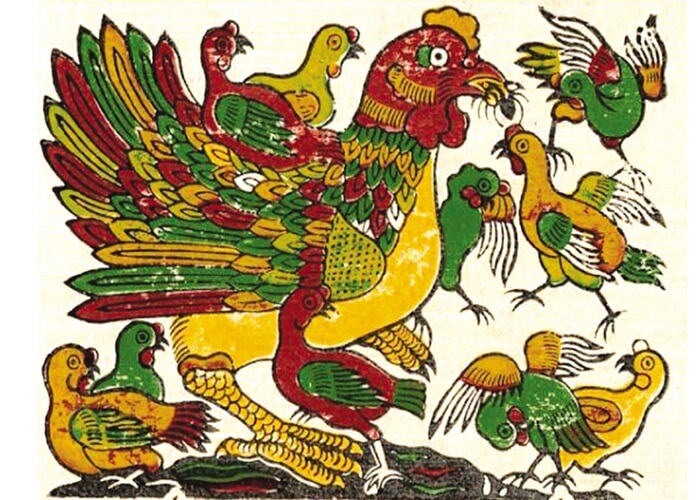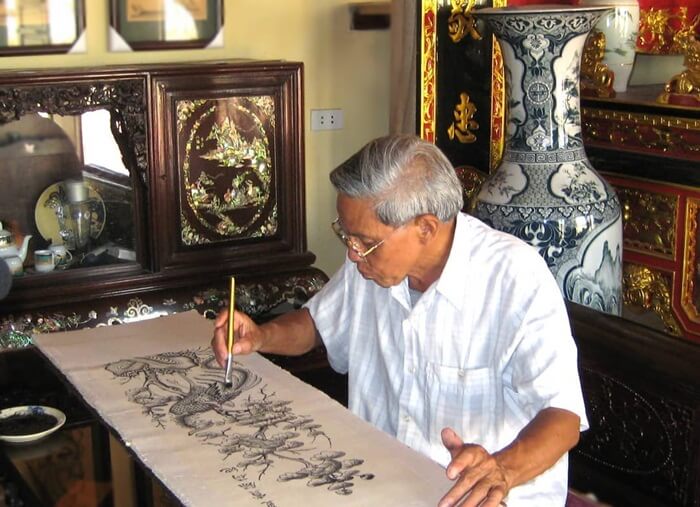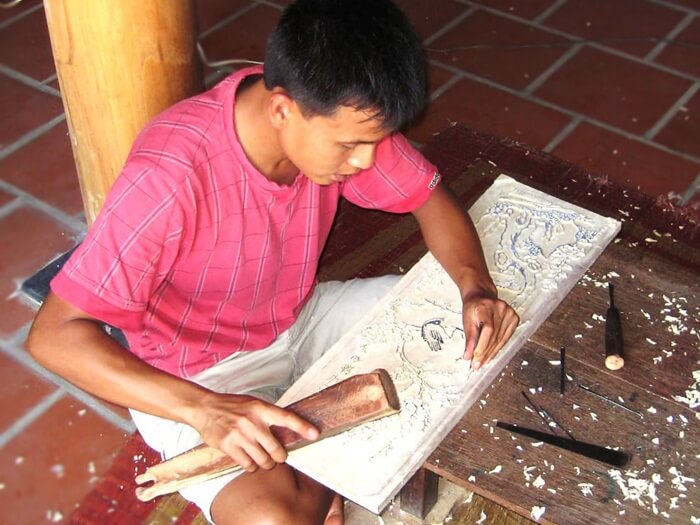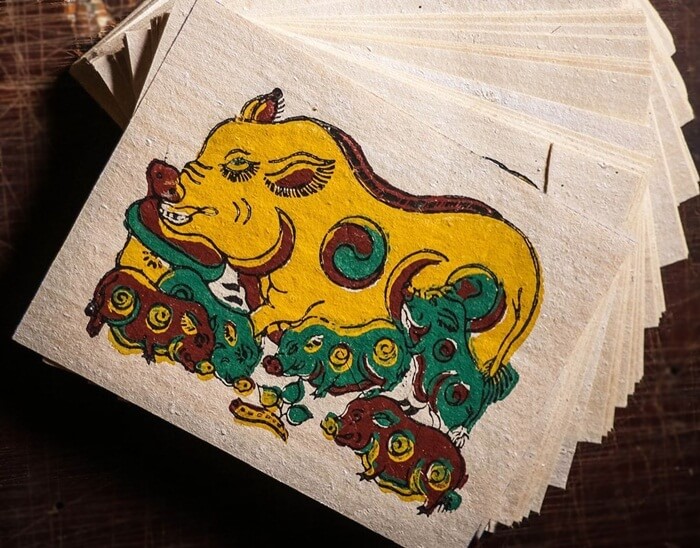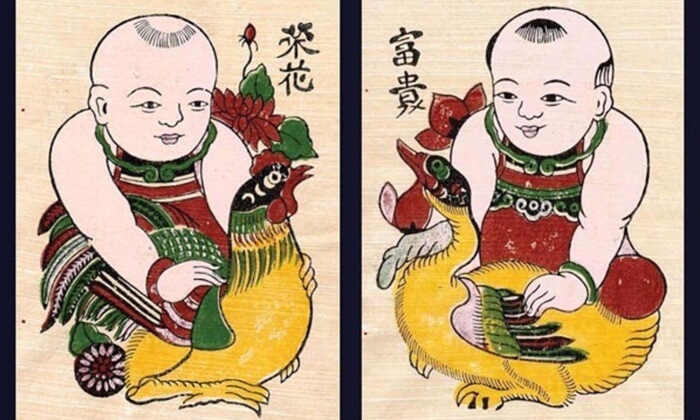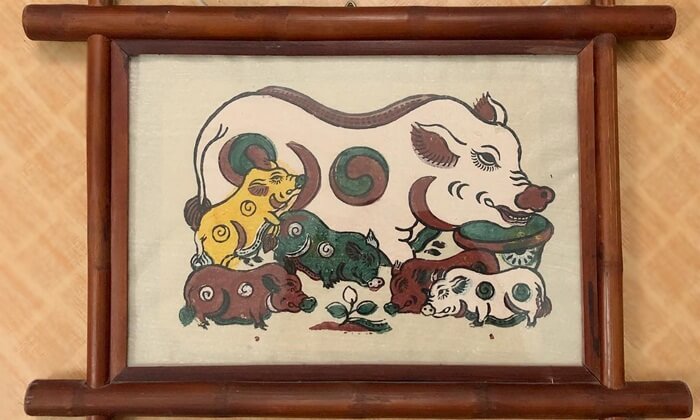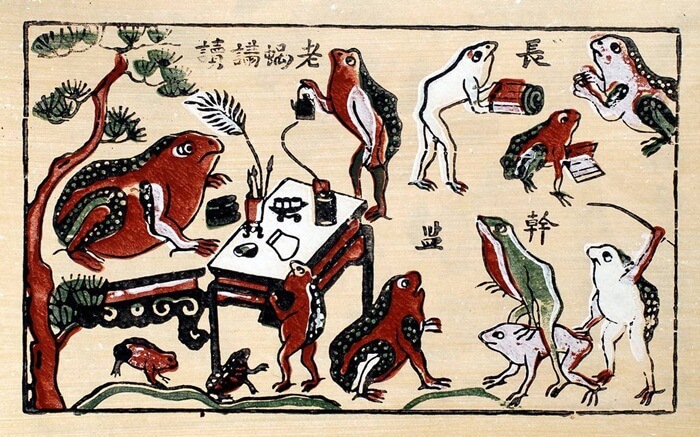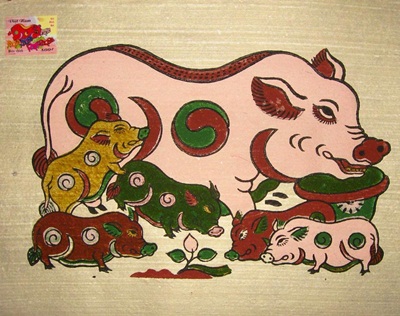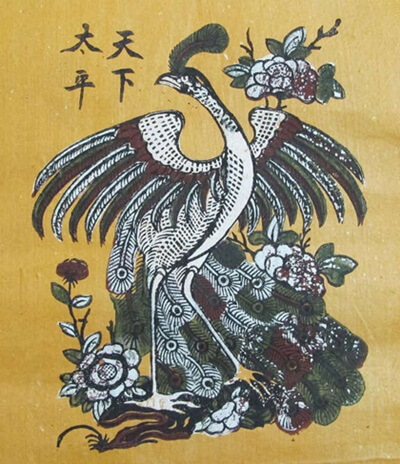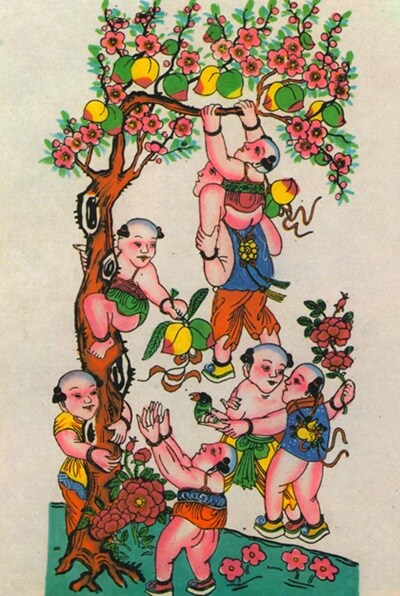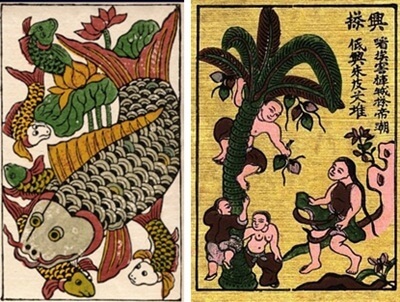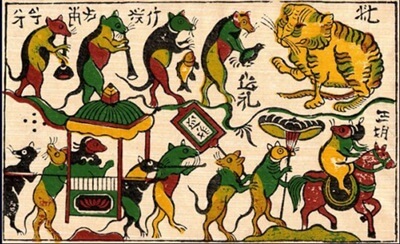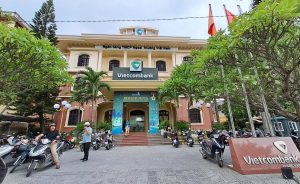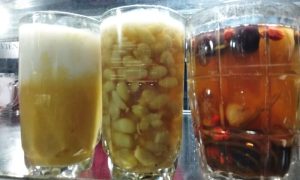Dong Ho Painting is a traditional Vietnamese art form. This type of painting has unique artistic value and is a breathtaking expression of the folklore of the northern region of Vietnam.
An outstanding contribution of Dong Ho Painting is that the thinking of yin and yang art, the art of balancing in painting, and simple drawing have gone beyond the scope of this type of painting, influencing and applying to various kinds of painting, sculpture, fashion, and ceramics, bringing new creativity.
- Dong Ho Painting Village
- Materials for making Dong Ho Paintings
- Dong Ho Painting production process
- The expressive meaning of Dong Ho Painting
- Typical Dong Ho Paintings
Dong Ho painting village
Dong Ho Painting Village is in Dong Ho commune, Thuan Thanh district, Bac Ninh province, 35 km west of Hanoi, the capital of Vietnam.
Dong Ho’s paintings have a long history, dating back to the 17th century. At that time, the painting village had about 17 prominent families, all of which were mainly engaged in painting and making paintings.
The village works in printing and drawing production all year round, and the busiest days are near the Lunar New Year because many people used to need to hang paintings when spring came.
Time has passed with many ups and downs. This traditional painting village has only a few families attached to producing folk paintings; the families of Nguyen Huu Sam and Nguyen Dang Che stand out.
Woodblock prints are among the painting profession’s most valuable items. The village’s artisans keep 1,000 woodblock prints and restore 500 ancient samples. All are considered treasures of the profession and are preserved very carefully.
In addition, artisans continue to invent new engravings with new content to suit customers’ increasingly diverse needs. These are valuable cultural sources not only in Vietnamese art but also in indigenous culture.
If you want to learn about Dong Ho paintings when visiting Hanoi, don’t miss this village!
- Dong Ho Folk Painting Center: http://tranhdongho.bacninh.com
- Find out about the Dong Ho painting production facility:
- Artist Nguyen Dang Che. Tel: 0223865308
- Artist Nguyen Dang Tam. Tel: 091 3009433
- Artist Nguyen Thi Oanh. Tel: 0362181135
- Artist Nguyen Huu Qua. Tel: 0946204698
Materials for making Dong Ho Paintings
Dong Ho paintings are produced in many stages using different materials.
However, it can be divided into two basic steps of painting: the stage of creating patterns or carving patterns on wooden boards and the stage of drawing or painting pictures.
Corresponding to each stage, we can see that the material will include the following:
Woodblock prints
All Dong Ho Paintings are printed from wooden engravings. Each color on the picture has a corresponding woodcut pattern; even the black-color version that creates the basic features of the picture must have a separate copy.
Wood prints can be divided into two types: basic stroke prints and color prints for pictures. The engraving is done meticulously and carefully. Usually, the more minor the stroke, the more beautiful it is. So, the artist often uses wood from the Gold apple tree, which has softwood, multi-dimensional grain, and is tough enough to be easy to sculpt.
Woodblock prints play an essential role in creating the theme for the Dong Ho Painting genre. Getting beautiful woodcuts requires meticulous work from artisans, and this stage usually takes up the most time in the production of Dong Ho paintings.
Creating patterns on wood blocks is a creative work that requires innate talent and high skills in wood carving. So, this work needs the synthesis of creational and practical abilities.
Artists can use pencils to draw basic lines on wood or thin paper. And then, they sculpt each line to have a standard shape.
This work to create a theme can have many variations and unique styles depending on the artist and family making the mold.
Dong Ho Painting paper
Dong Ho Painting paper comes from Giay Diep (shell paper), made from traditional and unique Vietnamese wind paper (Giay Gio). Gio trees are commonly grown near mountainous areas in Vietnam.
To make the picture beautiful, the people of Dong Ho Village added a step of processing wind paper to turn this paper into a typical type of Giay Diep (shell paper).
To create Giay Diep, producers crush scallop shells and mix them with a liquid made from glutinous rice flour, plain rice, or tapioca. The craftsman then sweeps the paper with a broom made of pine needles, creating a bright white paper that sparkles when left in the light.
Dong Ho Painting colors
Dong Ho Painting colors are produced from natural materials, so there are limited colors.
Four primary colors are usually used to produce paintings: blue made from indigo or copper rust, black from bamboo charcoal, yellow from crushed “Hoa Hoe” flowers, and red from unique wood or red stones.
The artist can transform these four basic colors to create various dark and light colors.
Dong Ho Painting production process
There are many stages in making a beautiful Dong Ho painting. However, it can be divided into the following steps:
- Step 1: Produce woodblock prints, colors, and Diep paper from wind paper (as mentioned above).
- Step 2: Mix colors depending on the type of painting and the subject.
- Step 3: Prepare to print; put the paper into a stack of 100 – 200 sheets for one printing time.
- Step 4: Print the picture. The worker dips a pine needle brush into the color pot to get the color and then sweeps it evenly on the cover (the cover is made of ordinary paper).
- Step 5: Take the woodblock pattern and roll it over and over on the color surface.
- Step 6: Put the wooden board on the paper, adjust it to be balanced and accurate, and press the printed board firmly.
- Step 7: Take the woodcut with the printing paper attached, then use a fine sponge- local people often use a loofah- to rub it evenly on the paper. This allows the color to penetrate evenly on the surface of the printed paper.
- Step 8: Remove the printed paper from the printing woodcut, bring it to dry in a cool place for a while to let the color dry, and absorb firmly into the paper.
- Step 9: When the picture printed has dried, print other colors. Repeat steps 8 and 9 until all the colors on the picture are fully printed.
Previously, almost all the coloring steps on Dong Ho Paintings used woodblocks. Today, many painters in Vietnam and Dong Ho Village also use the method of coloring and drawing more strokes to create a variety and richness in colors and lines for the picture.
Despite the renovation, the expression and unique beauty of Dong Ho Paintings have always been preserved and adhered to. Therefore, Dong Ho’s paintings always have their own charm no matter how they are done.
The expressive meaning of Dong Ho Painting
Regarding content, the Dong Ho Painting shows the daily activities and labor scenes of the people of North Vietnam. It depicts animals, thereby expressing people’s wishes in daily and spiritual life, such as describing the characters of the 12 zodiac animals.
It depicts a dream about a harmonious life between people, animals, and nature.
- The balance is according to the principle of yin and yang (like the picture of Hung Dua – Picking the Coconut).
- The painter wishes for a life of abundance, happiness, and harmony between material and spiritual (like the picture of Dan Lon Am Duong—the Pigs).
- Many paintings wish for a good society that brings good meaning to everyone and enriches the spiritual life of the Vietnamese people.
Regarding artistic value, Dong Ho’s paintings are valuable for home and office decoration, especially for beauty during the Tet holidays. Though simple but attractive, the lines contain many meanings, making it easy to apply beauty to many ceramic and fashion products.
In terms of artistic theme, Dong Ho Paintings can be divided into 7 typical types: worship paintings, congratulatory paintings, historical paintings, story-telling pictures, dialect paintings, landscape paintings, and paintings reflecting human activities.
Most people who hang Dong Ho Paintings wish for a harmonious family life full of love and prosperity.
Typical Dong Ho Paintings
With the diverse development and creation of artisans, Dong Ho has thousands of paintings with different meanings.
However, popularizing and becoming typical symbols of Dong Ho Paintings include the following typical works:
“Yin and Yang Pigs” have a robust expression but are also soft. Each pig has yin and yang circles, a way to tell people’s wishes, which is the harmony between earth, sky, humans, animals, and nature. The desire for abundance and proliferation of life is like the crowding of pigs. In short, the picture brings happiness, affluence, and a happy and harmonious family.
“The Peacock Spreading Its Wings” symbolizes nobility and prosperity. The image of a peacock is a symbol of beauty and strength. Many people believe that hanging peacock paintings in the house will ward off evil spirits and bring good luck to the owner.
The painting “That Dong” (Seven Children) usually has outstanding pink and red colors, which are very warm. The painting creates a feeling of freshness and joy on spring days. The peach tree is full of fruit, and the children are healthy. It is a wish for a lot of luck, a prosperous life, and plenty of children and grandchildren.
The painting “Ly Ngu Vong Nguyet” (Carp Looking At the Moon) shows the desire to succeed in study, fame, and career. The desire for the image of a carp comes from the belief in folklore that a carp crossing the heaven gate will turn into a dragon, like a student overcoming difficulties to achieve success.
The painting “Hung Dua” (Picking Up Coconuts) is indispensable in the outstanding collection of Dong Ho Paintings. Its look is simple but gentle, and it conveys the meaning of family reunion, harmony, sharing, and helping each other in life.
The painting “Dam Cuoi Chuot” (The Rat Wedding) is a delightful addition to Dong Ho’s collection of satirical paintings. The artist’s skill in creating a humorous narrative, with a rat trying to take the bride but having to pay tribute to the cat with fish and birds, serves as a reminder that life’s funny obstacles are there.
